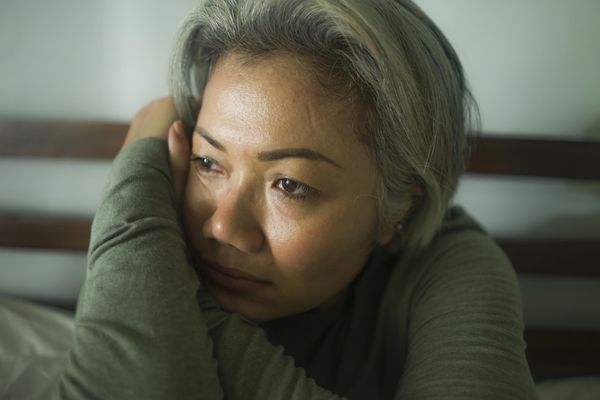Depression can affect anyone regardless of age, race, class or gender. According to Mental Health America, depression afflicts more than 19 million American adults each year, approximately 12 million of whom are women.
While it's normal to feel sad from time-to-time, depression is different. It can be unrelenting and may interfere with daily life and functioning. And sometimes, more subtle signs and symptoms can reveal this mood disorder.
If you experience any of the symptoms below, talk to your healthcare provider. You can take steps to help address any concerns. Depression may respond well to medication and psychotherapy. Alternative treatments including brain stimulation therapy, exercise, acupuncture, meditation and nutrition may help, too.
Here are some symptoms of depression you should never ignore.
Feeling depressed, irritable or even suicidal
One of the hallmarks of depression is a depressed or volatile mood and a decreased interest or pleasure in most activities. Sometimes others will notice and comment that you look sad or are often tearful. Suicidal thoughts, thoughts of death or thoughts of a suicide plan are symptoms of depression where you should seek immediate help from a healthcare provider.
Aches and pains
That ache in your back may not just be a sign that you're growing older or from pulling a muscle. When you're dealing with a mental health condition, you may also experience physical issues. Headaches, back pain, digestive issues and sore muscles can all be signs of depression, if there is no clear physical cause or if you don't respond to treatment. "Listen to your body, and don't chock pain up to simply aging or muscle injury," says Freda Lewis-Hall, M.D., DFAPA, Chief Patient Officer and Executive Vice President, Pfizer. "Depression and physical pain can have a biological connection. If you're experiencing physical pains, share them with your healthcare provider."
Trouble concentrating
Some people with depression may lose their keys not just once (which is totally normal) but all the time. You may be depressed if you frequently misplace everyday objects, are often forgetful, have difficulty staying focused or feel like you're constantly in a fog. Research suggests that the brains of people living with depression sometimes struggle to take in new information quickly and efficiently, which can impact your work and personal relationships, says Dr. Lewis-Hall.
Sudden weight change
For most of us, food brings joy and satisfaction. But when you're depressed, increased stress hormones can cause a reduction in appetite. On the flipside, changes to your immune system or metabolism brought on by depression can also cause you to overeat. Flag any major changes in appetite or eating habits to your healthcare provider so he has the full picture about the status of your health, says Dr. Lewis-Hall.
Inability to sleep
We've all had an occasional bad night's sleep. That's no cause for alarm. If you have persistent difficulty sleeping, though, it may be a symptom of depression. Even when people with depression are exhausted, they can sometimes struggle to fall or stay asleep. Conversely, some people may experience fatigue, a loss of energy and find they can't get out of bed in the morning no matter how many hours of sleep they've gotten. "While insomnia – the most common type of sleep disorder – isn't always linked to depression, it's still important to pay attention to changes in your sleep patterns and to seek help from a healthcare professional who can help diagnose what's really going on if changes do occur," says Dr. Lewis-Hall.
Feelings of guilt
"I'm sorry," comes out of your mouth all day long. You apologize for even minor mistakes and feel like you've done something wrong multiple times a day. Persistent feelings of guilt may be a subtle sign of depression, says Dr. Lewis-Hall. "Brain scans indicate that people with depression sometimes respond differently to feelings of guilt and responsibility, which may cause you to feel like it's your fault, even when it isn't," says Dr. Lewis-Hall.
Indecisiveness
Tea or coffee? Skirt or dress? Watch TV or call a friend? Even simple and small decisions overwhelm you. Issues that you normally don't think twice about suddenly become tough to make. If you suddenly and persistently find yourself being indecisive, that may be a symptom of depression. This is because strong emotions and concerns about the future can affect your rational thought processes and impact your decision-making skills, even when those decisions are basic and non-consequential.
Recklessness
While both men and women get depression, their willingness to talk about their feelings are not the same. "The unfortunate truth is this: Some with depression often feel like the need to hide their emotions," says Dr. Lewis Hall. "This can lead to unhealthy behaviors such as drinking too much and even violent behavior. Regardless of gender, don't ignore or downplay these signs; the act of doing so may cause depression to go undiagnosed."
There isn't just one symptom of depression. That's why it's important to share in detail how you're feeling – both mentally and physically – with your healthcare provider to ensure you can get the diagnosis and treatment that's right for you.
- The Life-Changing Hope of New Treatments for Clinical Depression ›
- Battling Postpartum Depression Feels Different When You’re Black ›
- Why Aren't Women Speaking Up About Postpartum Depression? ›
- Signs of Mental Illness ›
- 5 Reasons You Might Be Depressed ›







